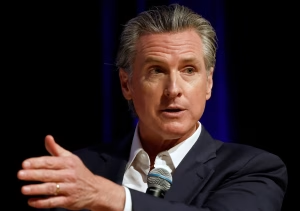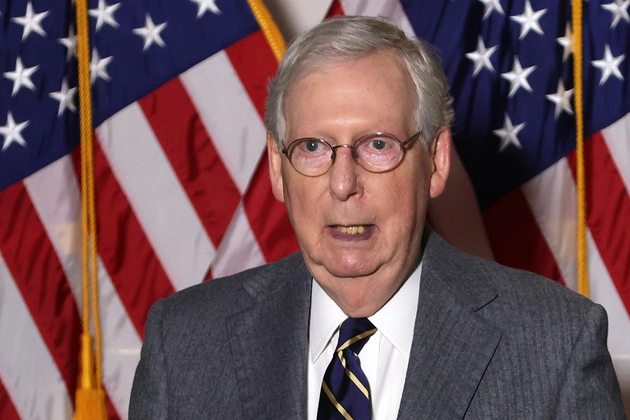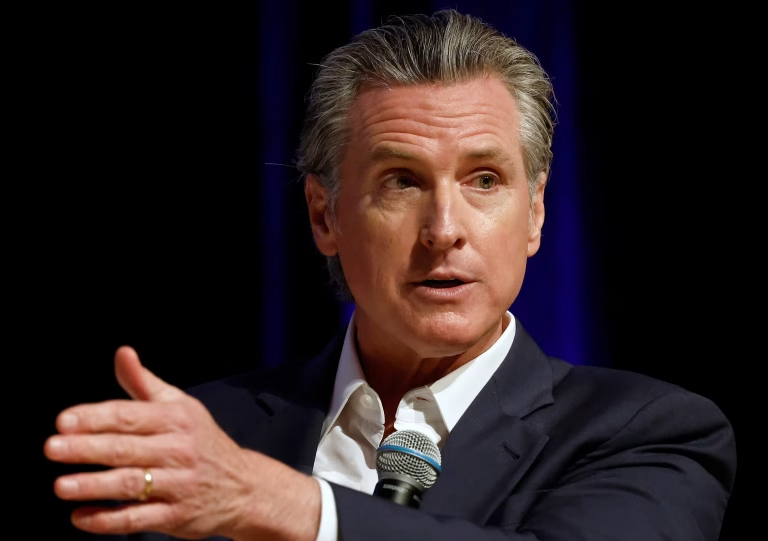Kentucky Senator Mitch McConnell, 83, fell to the ground in a Senate office building Thursday after being approached by a young activist who questioned him about his position on Immigration and Customs Enforcement (ICE). The incident — which was captured on video and widely circulated online — marks at least McConnell’s third public fall since late last year, reigniting discussions about the aging leadership class in Washington and the physical toll of long political careers.
The Fall Caught on Camera
The event unfolded on October 16, 2025, in the Russell Senate Office Building. A young woman, reportedly affiliated with the climate advocacy group Sunrise Movement, approached McConnell in the hallway as he walked beside an aide wearing an earpiece.
In the video, the activist introduces herself before launching into a pointed question: whether McConnell supports ICE “taking working people off the streets and kidnapping them” — a reference to recent immigration raids in Chicago and Portland that have drawn criticism for alleged excessive force and mistaken detainments.
McConnell, walking stiffly and appearing to rely on the aide for balance, did not immediately respond. Moments later, as the activist finished her question, he stumbled and fell toward his left side. Gasps echoed through the corridor as two individuals — including a Capitol Police officer — rushed to assist him.
Visibly disoriented but conscious, McConnell allowed them to help him to his feet. He then looked toward the camera, waved briefly, and made a faint noise before being escorted away by his staff.
Sunrise Movement’s Response
The video quickly spread on social media, drawing both sympathy and criticism. The Sunrise Movement — known for its confrontational tactics and focus on climate and social justice — issued a blistering statement shortly afterward.
“These are the people running our government,” said the group’s executive director, Aru Shiney-Ajay. “Mitch McConnell couldn’t even answer a simple question without falling down, and it’s certainly not the first time he hasn’t been able to answer young people.”
The statement went on to broaden its critique beyond McConnell. “Both parties are run by out-of-touch octogenarians who have been in politics for longer than we’ve been alive,” Shiney-Ajay said. “Their incompetence and need to cling to power aren’t just embarrassing; they’re costly, and the American people are paying the price.”
The senator’s office did not immediately respond to requests for comment about the incident or his current health status.
A Pattern of Health-Related Incidents
Thursday’s fall is the latest in a series of public health scares for McConnell, who served as the Republican Senate leader for 18 years before stepping down in 2024 amid growing questions about his fitness for office.
In March 2023, McConnell suffered a concussion and a minor rib fracture after falling at a private dinner event in Washington, D.C. He was hospitalized for nearly five days and underwent weeks of physical therapy.
Just months later, in July 2023, McConnell alarmed colleagues when he froze mid-sentence during a press conference at the Capitol. Standing before a group of reporters, he abruptly stopped speaking, stared straight ahead, and appeared unresponsive for several seconds until Senate colleagues ushered him away.
After a brief recess, McConnell returned to the microphones and told reporters, “I’m fine,” but the incident prompted questions about whether he had experienced a mini-stroke or seizure.
Then, in August 2023, a similar event occurred in Kentucky when McConnell once again froze while responding to a question about his 2026 reelection plans. Aides and reporters observed that his eyes locked in place and his expression went blank — almost identical to the earlier episode.
Medical Evaluations and Disputed Explanations
Following the second freezing episode, McConnell agreed to undergo a series of medical evaluations by the attending physician of the U.S. Congress. According to a memo released at the time, the physician — Dr. Brian Monahan — conducted an MRI scan, an EEG brain study, and consultations with several neurologists.
The conclusion, Monahan wrote, showed “no evidence” that McConnell had experienced a seizure, stroke, or other neurological disorder. Instead, he suggested that lingering effects of McConnell’s March concussion, combined with dehydration, could have caused the episodes.
That explanation, however, did not satisfy everyone. Fellow Kentucky senator and ophthalmologist Rand Paul publicly disputed Monahan’s findings, telling The Hill that the diagnosis was “not believable.”
“When you get dehydrated, you don’t have moments where your eyes look in the distance with a vacant look and you’re basically unconscious with your eyes open,” Paul argued. “That is not a symptom of dehydration. What’s occurring from what I’ve seen is a neurological event.”
While McConnell’s team has continued to assure colleagues and the public that he is in good health, Thursday’s fall has reignited speculation that the senator’s physical condition may be deteriorating.
A Career Defined by Power and Controversy
Mitch McConnell has been a central figure in American politics for nearly four decades. First elected to the Senate in 1984, he rose to prominence as one of the most skilled and strategic legislators of his generation.
As the longest-serving party leader in Senate history, McConnell shaped the modern Republican Party’s judicial and legislative priorities. His decision to block the confirmation of President Obama’s 2016 Supreme Court nominee, Merrick Garland, fundamentally altered the political landscape, leading to a conservative majority that continues to shape U.S. law.
Yet in recent years, questions about his health have overshadowed his political legacy. McConnell’s visible frailty — combined with similar concerns about aging leaders like President Joe Biden, 82, and former House Speaker Nancy Pelosi, 85 — has fueled a growing national conversation about generational turnover in government.
Bipartisan Concerns About Age and Leadership
Both parties have faced criticism over the advanced age of their leadership. Polls consistently show that a majority of Americans — including majorities of Democrats and Republicans — believe there should be upper age limits for members of Congress and presidential candidates.
Political analysts note that the optics of McConnell’s falls, Biden’s occasional stumbles, and other public health incidents have eroded public confidence in the nation’s leadership.
“It’s not just about one senator or one president,” said Dr. Rachel Carmichael, a political psychologist at Georgetown University. “It’s about what these repeated incidents symbolize. Americans see them as a reflection of a system that’s become stagnant — where leaders stay in power for decades, even when their physical or cognitive abilities are declining.”
McConnell’s fall, she said, “hits the same nerve that Biden’s speech gaffes or Dianne Feinstein’s confusion once did. It feeds the perception that the political establishment is out of touch, aging, and unwilling to step aside.”
The Broader Debate on Fitness and Responsibility
While supporters have defended McConnell as sharp and capable, critics argue that continued incidents raise legitimate concerns about fitness for duty.
“The issue is not whether he’s a good legislator or not,” said Dr. Steven Harper, a political ethics expert. “The issue is whether he — or anyone at that age, after multiple falls and neurological episodes — can responsibly handle the physical and mental demands of national leadership.”
Public health specialists also note that recurrent falls and freezing episodes in older adults can indicate deeper neurological or balance-related disorders. While McConnell’s doctors have ruled out major diagnoses, many outside experts remain skeptical.
“Concussions can have lingering effects, but multiple unexplained episodes over a span of years suggest something more,” said Dr. Elaine Foster, a neurologist at Johns Hopkins University, who spoke generally about such symptoms without diagnosing McConnell. “It’s not unusual for older individuals with previous head trauma to experience instability or momentary lapses in motor control.”
What Comes Next
McConnell’s current Senate term runs until January 2027, and as of now, he has not announced whether he intends to retire or seek reelection. While the incident has raised fresh questions about his health, longtime allies insist he remains mentally sharp and politically engaged.
“He’s still Mitch — methodical, strategic, and completely in command of the details,” one senior GOP aide told PEOPLE on condition of anonymity. “He’s had a few physical challenges, but his mind is as sharp as ever.”
Still, for many Americans watching the latest video, the image of an 83-year-old senator collapsing mid-question was difficult to separate from the broader question now facing Washington: when is it time to step aside?
As the country grapples with the growing generational divide in its leadership, Mitch McConnell’s latest fall may serve as another reminder — not just of human fragility, but of the urgent debate over what it means to serve, lead, and eventually let go.

Emily Johnson is a critically acclaimed essayist and novelist known for her thought-provoking works centered on feminism, women’s rights, and modern relationships. Born and raised in Portland, Oregon, Emily grew up with a deep love of books, often spending her afternoons at her local library. She went on to study literature and gender studies at UCLA, where she became deeply involved in activism and began publishing essays in campus journals. Her debut essay collection, Voices Unbound, struck a chord with readers nationwide for its fearless exploration of gender dynamics, identity, and the challenges faced by women in contemporary society. Emily later transitioned into fiction, writing novels that balance compelling storytelling with social commentary. Her protagonists are often strong, multidimensional women navigating love, ambition, and the struggles of everyday life, making her a favorite among readers who crave authentic, relatable narratives. Critics praise her ability to merge personal intimacy with universal themes. Off the page, Emily is an advocate for women in publishing, leading workshops that encourage young female writers to embrace their voices. She lives in Seattle with her partner and two rescue cats, where she continues to write, teach, and inspire a new generation of storytellers.









